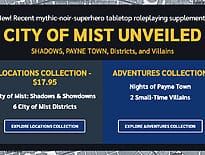Osamu Tezuka’s Metropolis has been out since 2001, and the gorgeous dual-format steel book since 2017. I went to see it at Scotland Loves Anime for two reasons.

Firstly, Metropolis kicked off the Edinburgh leg of this anime festival, and I didn’t want to miss it.
Secondly, I wanted to see if I liked this highly acclaimed anime more than I did the first time I watched it. Perhaps the big cinema screen would make a difference.
It didn’t. Sure, it helped a little, but the build-up in Metropolis is slow, and I find it impossible to watch without thinking of it as grimdark Tintin in a transistor-punk world without women.
The world of the Metropolis is a dark one; skyscrapers reach into the polluted sky, and armies of robots do the mundane work. Working robots don’t seem to help anyone as humans are without jobs, resulting in anger and hostility to the machines that seem to be sentient.
Trouble starts when a Japanese detective, who looks like a Tintin-style police inspector, brings his nephew Kenichi to track down the rogue Dr. Laughton.

At the same time, Duke Red, an influential figure in the city, completes The Ziggurat skyscraper. Unfortunately, a robot interrupts the opening ceremony and triggers Duke Red’s adopted son, Rock, into an anti-robot rampage.
These threads all tie together, and before we know it, Kenichi is trying to keep one of Dr Laughton’s experiments, a girl called Tima, safe from the handsome but insane Rock.
It might sound like a romp, but don’t get used to characters as they die as often as people do in Game of Thrones.
Tintin or Astro Boy style art, a retro-future, Game of Throne-level death and robot revolutions are odd bedfellows.
The good news is that as Metropolis winds on, the plot picks up, the tempo increases and the art choice becomes less jarring. I’m not sure it still ever makes much sense, with people or robots making strange choices and sometimes cleverly built foreshadowing going nowhere without it ever feeling like clever misdirection.

However, once you’re through the ‘go faster’ early stage, then it’s never terrible. It’s just Metropolis has so much to claw back from.
Yes, the whole thing is derived from the iconic silent sci-fi of the same name by Fritz Lang. At the start of tonight’s performance, the festival director Andrew Partridge told the audience that Osama Tezuka never actually watched the original Metropolis despite trying to base this anime on it. I believe it.
I have no regrets, but I don’t need to give Metropolis a third chance, and when I get back into a Scotland Loves Anime cinema seat later this week, it’ll be for all new experiences.


